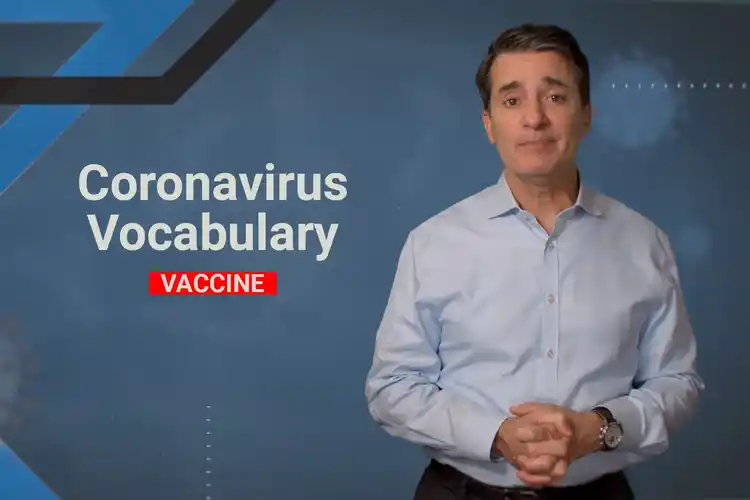Coronavirus Vocabulary: Vaccine

Hide Video Transcript
Video Transcript
[MUSIC PLAYING]
What is a vaccine, and how exactly does it work? Vaccines are unique in medicine that they're designed to prevent rather than cure an illness. Typically, they contain a tiny amount of a disease that's been either killed or weakened to the point that it can't make you sick. The idea is to stimulate your immune system into action so that it produces protective antibodies in the same way it would if you actually got sick.
We already have vaccines that protect us from more than 20 life-threatening diseases. The World Health Organization estimates they prevent up to 3 million deaths per year from diseases such as flu, measles, and tetanus. Most vaccines are delivered by a shot or an injection, but some are sprayed in through the nose or even swallowed.
And by the way, you might hear the term "immunization." It means exactly the same thing as vaccination. Some of the candidates for a COVID-19 vaccine are using a new technology that uses messenger RNA. An mRNA vaccine contains a synthetic version of the RNA that viruses use to form proteins. The vaccine doesn't contain enough genetic information to produce viral proteins, just enough to trick the immune system into thinking a virus is present so that it will spring into action to make those antibodies.
[MUSIC PLAYING]
SPEAKER
Coronavirus has been teaching us a lot about infectious disease and public health, but it's also teaching us a lot of new words. I'm going to help you talk coronavirus. It really is learning a new language. What is a vaccine, and how exactly does it work? Vaccines are unique in medicine that they're designed to prevent rather than cure an illness. Typically, they contain a tiny amount of a disease that's been either killed or weakened to the point that it can't make you sick. The idea is to stimulate your immune system into action so that it produces protective antibodies in the same way it would if you actually got sick.
We already have vaccines that protect us from more than 20 life-threatening diseases. The World Health Organization estimates they prevent up to 3 million deaths per year from diseases such as flu, measles, and tetanus. Most vaccines are delivered by a shot or an injection, but some are sprayed in through the nose or even swallowed.
And by the way, you might hear the term "immunization." It means exactly the same thing as vaccination. Some of the candidates for a COVID-19 vaccine are using a new technology that uses messenger RNA. An mRNA vaccine contains a synthetic version of the RNA that viruses use to form proteins. The vaccine doesn't contain enough genetic information to produce viral proteins, just enough to trick the immune system into thinking a virus is present so that it will spring into action to make those antibodies.
[MUSIC PLAYING]
